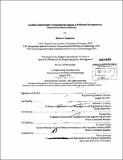Costing commonality : evaluating the impact of platform divergence on internal investment returns
Author(s)
Cameron, Bruce G. (Bruce Gregory)
DownloadFull printable version (41.66Mb)
Alternative title
Evaluating the impact of platform divergence on internal investment returns
Other Contributors
Massachusetts Institute of Technology. Engineering Systems Division.
Advisor
Edward F. Crawley.
Terms of use
Metadata
Show full item recordAbstract
Platforming has become an important means of cost-sharing among industrial products. However, recent research has shown that many firms face systemic downward pressure on commonality, with the result that many platforms realize less commonality than intended. This research was chartered to evaluate the costing of commonality benefits, the associated returns from commonality investments, and the potential impact of divergence on commonality benefits. This dissertation used a tiered approach to the research questions. A statistical study of commonality returns was conducted, finding evidence for a potential link between divergence and cost growth. Broad practice surveys of 16 firms revealed cost allocation practices and internal funding strategies as potential determinants of the commonality-cost relationships. Three detailed case studies were conducted to trace benefit trajectories through platformed products in the presence of commonality changes. We find support for the hypothesis that divergence has cost consequences, notably reducing inventory benefits, creating higher quality expenses and requiring additional manufacturing coordination. Additionally, we show that lead variants bearing platform costs achieved weaker investment returns and re-captured few benefits from later variants. We find also find evidence to refute the notion that representation at design reviews ensures downstream benefits are represented. Several management practices for making commonality decisions are identified. We propose a framework for commonality cost decisions, which explicitly captures the impact of individual variant decisions on the platform's cost structure. We identify a commonality cycle, a progression of commonality strategies seen by firms, driven by growing benefit analogies among platforms enabling larger investments, premature investment evaluation, and unrealized returns on commonality investments.
Description
Thesis (Ph. D.)--Massachusetts Institute of Technology, Engineering Systems Division, 2011. Cataloged from PDF version of thesis. Includes bibliographical references (p. 248-253).
Date issued
2011Department
Massachusetts Institute of Technology. Engineering Systems DivisionPublisher
Massachusetts Institute of Technology
Keywords
Engineering Systems Division.